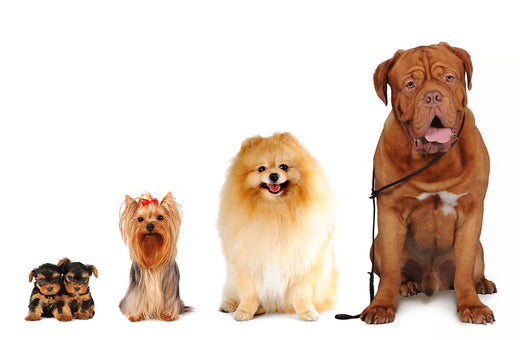The life cycle of dogs includes four stages – puppyhood, adolescence, adulthood and senior years. On an average, it is the smaller breeds of dogs which attain maturity faster and live for longer years. The larger breeds mature late and usually have shorter periods of adulthood and senior years. However, the individual rate of aging varies from dog to dog and would generally depend upon genetics and quality of nutrition and care offered.
Having a prior knowledge of their general behavioral patterns at different stages of their life, would help you in understanding them and their needs better.
Also, dietary needs of your dog change as it travels from one juncture of its life to another. Many brands like Pedigree, Royal Canin, Hill’s Science and Drools offer special diets, which have been designed to match the different nutritional requirements at various life stages of dogs.
- Puppyhood
After a gestation period of 63 days a puppy is born; a smaller breed canine baby remains a pup till 6 to 18 months of age. Larger breeds enter adolescence a little later than the smaller ones. The first weeks of a puppy’s life are very critical and should be spent lovingly and playfully with mother and siblings, as that would provide the puppy with important nutrients to grow as well as the right company to learn.
Puppyhood is a learning stage wherein the puppy gets to know the right way to interact with humans, other dogs, and other pets. Puppyhood is the phase in which house training should be imparted to the little canine. It is also the time to get the dog its complete set of vaccinations.
- Adolescence
The period of puberty starts from 6 to 18 months of age. This is the time when your canine’s hormones come into play. Though short lived, this phase may highlight a disobedient side of your dog. With respect to its learning program, it may not show any interest in learning. It might also forget the previous training instructions or pretend to have forgotten them.
Over here, persistence is the key to get through; just keep going with the teaching sessions.
- Adulthood
Your dog generally becomes an adult between 1 to 3 years of age; smaller dogs would reach adulthood earlier than the larger ones. You would be able to catch the visible signs of adulthood in your male dog when it starts to lift its leg while urinating. In a female, puberty ends when she goes into heat for the first time. But please note that as the organs of the bitch are not fully developed, at the time of first heat, it should not mate.
The dog would continue to enjoy exercise and play sessions but would become less demanding. It would also not display abundant energy that kept you busy in earlier stages. In all probabilities, it has attained complete house training by now. Mental and physical exercises would continue to help the dog develop well.
- Senior
Your dog would enter senior stage of its life between 6 to 10 years of age. And it is this stage where the larger breed dogs reach earlier than the smaller breeds. In the senior years, the muzzle of the dog would start to turn grey. The dog would slow down, thus a leisurely walk would be much preferred to a game of fetch.
A senior dog would prefer to eat less and sleep more than it has slept at other phases of its life. Dog may also experience weakening of the sense of sight and hearing. Even its metabolism would slow down and gradually the dog will start to gain weight. At this time it is best to offer it smaller portions of food 2/3 times a day, and thereby bring relief to its digestive system.
Your canine friend brings you ample of joys; its love for you would never change, though its body would forever go on changing, just like yours. Keeping track of its altering needs would go a long way in assuring a healthier and happier pet.

